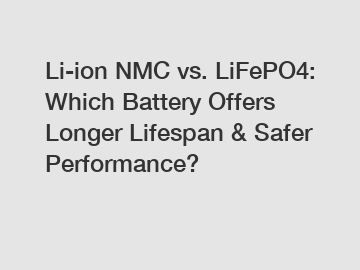Dec. 23, 2023
Electrical Equipment
For more information, please visit Lithium Storage.
Li-ion NMC vs. LiFePO4: Which Battery Offers Longer Lifespan & Safer Performance?
Li-ion batteries have become a staple in our everyday lives, powering our smartphones, laptops, and electric vehicles. However, when it comes to choosing the right battery for a particular application, not all Li-ion batteries are created equal. Two popular options in the market are Li-ion NMC (Lithium Nickel Manganese Cobalt Oxide) and LiFePO4 (Lithium Iron Phosphate). Let's delve deeper into these two battery technologies and determine which one offers a longer lifespan and safer performance.

1. Lifespan:
Li-ion NMC batteries are known for their high energy density, which translates to a longer run-time per charge. They possess a higher capacity to store energy, making them suitable for demanding applications such as electric vehicles. However, the trade-off for this high energy density is a shorter lifespan. Li-ion NMC batteries tend to degrade over time due to the instability of certain materials used in their construction, leading to reduced overall capacity. On the other hand, LiFePO4 batteries have a lower energy density but offer a significantly longer lifespan. With their robust and stable chemistry, LiFePO4 batteries can endure thousands of charging cycles without experiencing significant capacity loss. This makes them a preferred choice for applications where longevity is crucial, such as renewable energy storage.
2. Safety:
Safety is a paramount concern when it comes to batteries. Li-ion NMC batteries have a higher risk of thermal runaway and are more prone to overheating and catching fire compared to LiFePO4 batteries. This is due to the presence of cobalt in their chemistry, which can lead to thermal instability under certain conditions. On the other hand, LiFePO4 batteries are exceptionally safe and exhibit superior thermal stability. Their iron-phosphate chemistry offers excellent resistance against thermal runaway, making them less likely to overheat or cause accidents. This safety advantage has led LiFePO4 batteries to be widely used in critical applications such as medical devices and aerospace systems.
3. Charging and Discharging Rates:
Another factor to consider when comparing these two battery technologies is their charging and discharging rates. Li-ion NMC batteries have a higher charging and discharging efficiency, allowing for faster charging times and greater power output. They are well-suited for applications that require high power bursts or quick charging, such as electric vehicles. On the other hand, LiFePO4 batteries have a lower charging and discharging efficiency but are more tolerant to high charging rates. They are better suited for applications that require a steady and reliable power supply, such as solar energy storage.
4. Environmental Impact:
Sustainability is a growing concern in today's world, and choosing an environmentally friendly battery technology is vital. Li-ion NMC batteries contain materials like cobalt and nickel, which are mined under hazardous conditions in certain parts of the world. The extraction and disposal of these materials can have detrimental effects on the environment and human health. In contrast, LiFePO4 batteries use iron and phosphorous, which are more abundant and have fewer ecological concerns. They are considered more eco-friendly and have a lower carbon footprint compared to Li-ion NMC batteries.
In conclusion, both Li-ion NMC and LiFePO4 batteries have their own strengths and weaknesses. Li-ion NMC batteries offer high energy density and fast charging capabilities but come with a shorter lifespan and safety concerns. LiFePO4 batteries, on the other hand, offer superior longevity, excellent safety, and eco-friendliness but have lower energy density and slower charging rates. The choice between these two battery technologies ultimately depends on the specific requirements of the application, weighing factors such as lifespan, safety, power output, and environmental impact. Overall, LiFePO4 batteries provide a compelling option for applications that prioritize longevity and safety, while Li-ion NMC batteries excel in situations that demand high energy density and rapid charging.
Are you interested in learning more about lifepo4 battery prismatic? Contact us today to secure an expert consultation!
Previous: What is a 7 pin connector used for?
Next: Mastering Spectrum Analyzer: Unraveling RBW and VBW Settings for Accurate Analysis
If you are interested in sending in a Guest Blogger Submission,welcome to write for us!
All Comments ( 0 )